

Recent Posts
Messaging with NATS and Java
Figure 1. NATS Architecture Component Diagram NATS is a high-performance messaging system that offers simplicity, speed, and scalability. It is particularly suited for building distributed systems and microservices. This article demonstrates how to integrate NATS with Java, showcasing the essential steps to set up, connect, and publish/subscribe to messages. Prerequisites Before diving in, we should ensure to have the following installed: Java Development Kit (JDK) 11 or later. Maven or Gradle for dependency management. Docker (optional). ...
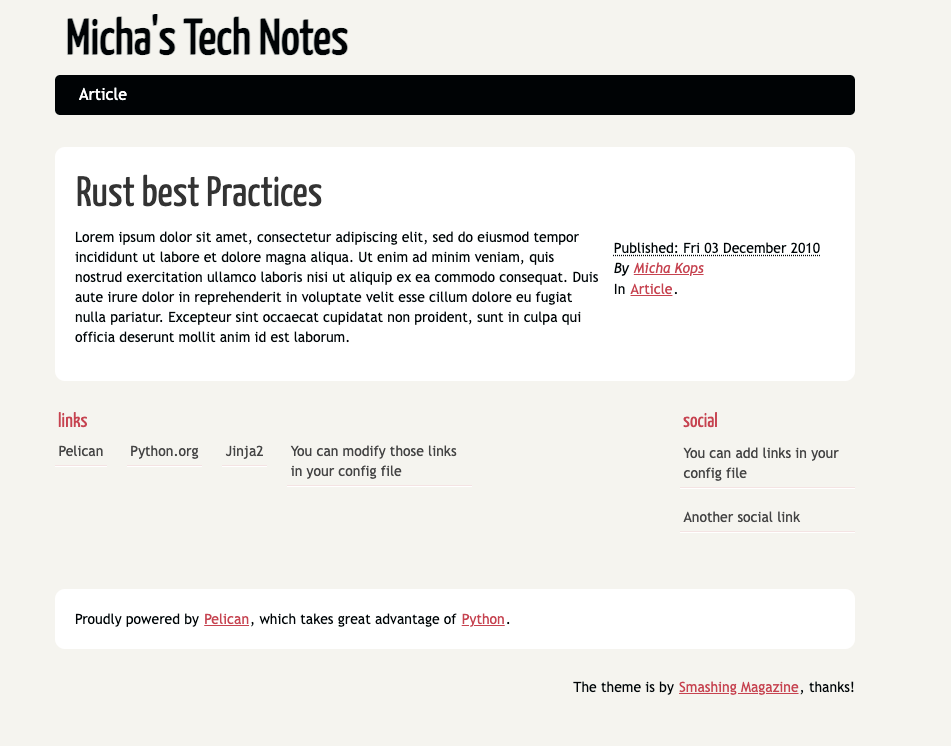
Pelican Blog Quickstart with Docker
Prerequisites We need to have at least Docker installed. Creating the Blog First we’re creating a new directory for our blog and generate the blog structure using William Jackon’s docker-pelican: mkdir my-site cd my-site docker container run -it --rm --entrypoint pelican-quickstart -v ${PWD}:/pelican-site ghcr.io/williamjacksn/pelican Welcome to pelican-quickstart v4.9.1. This script will help you create a new Pelican-based website. Please answer the following questions so this script can generate the files 1 Title: My First Review needed by Pelican. > Where do you want to create your new web site? [.] > What will be the title of this web site? Micha's Tech Notes > Who will be the author of this web site? Micha Kops > What will be the default language of this web site? [C] > Do you want to specify a URL prefix? e.g., https://example.com (Y/n) Y > What is your URL prefix? (see above example; no trailing slash) https > Do you want to enable article pagination? (Y/n) n > What is your time zone? [Europe/Rome] > Do you want to generate a tasks.py/Makefile to automate generation and publishing? (Y/n) > Do you want to upload your website using FTP? (y/N) > Do you want to upload your website using SSH? (y/N) > Do you want to upload your website using Dropbox? (y/N) > Do you want to upload your website using S3? (y/N) > Do you want to upload your website using Rackspace Cloud Files? (y/N) > Do you want to upload your website using GitHub Pages? (y/N) Done. Your new project is available at /pelican-site ...
Handling Secrets with SOPS
Installation using homebrew brew install sops manual download download from GitHub https://github.com/getsops/sops/releases Using SOPS Create a sops.yaml sops.yaml creation_rules: # encrypt stuff in .secrets - aws_profile: default kms: arn:aws:kms:eu-central-1:1234567890:key/abcdefg-0123456-abcdefg (1) path_regex: ^./secrets/.*$ (2) 1 We are using AWS KMS for encryption/decryption 2 All files in the directory .secrets will be encrypted Inplace Encrypt sops -e -i .secrets/mysecret.yaml Inplace Decrypt sops -d -i .secrets/mysecret.yaml Complete Example using PGP Install GPG and create a new Key Install the GPG binaries .Linux / apt sudo apt install gnupg ...
Object Audit with Java and Javers
Just a quick snippet Maven Integration pom.xml <dependency> <groupId>org.javers</groupId> <artifactId>javers-core</artifactId> <version>${javers.version}</version> </dependency> Calculate Changes in Object Graph package io.hascode; import org.javers.core.Changes; import org.javers.core.Javers; import org.javers.core.JaversBuilder; import org.javers.core.diff.Diff; public <T> Changes diff(T snapshot, T latest) { Javers javers = JaversBuilder.javers().build(); Diff diff = javers.compare(snapshot, latest); return diff.getChanges(); } Resources Javers Website
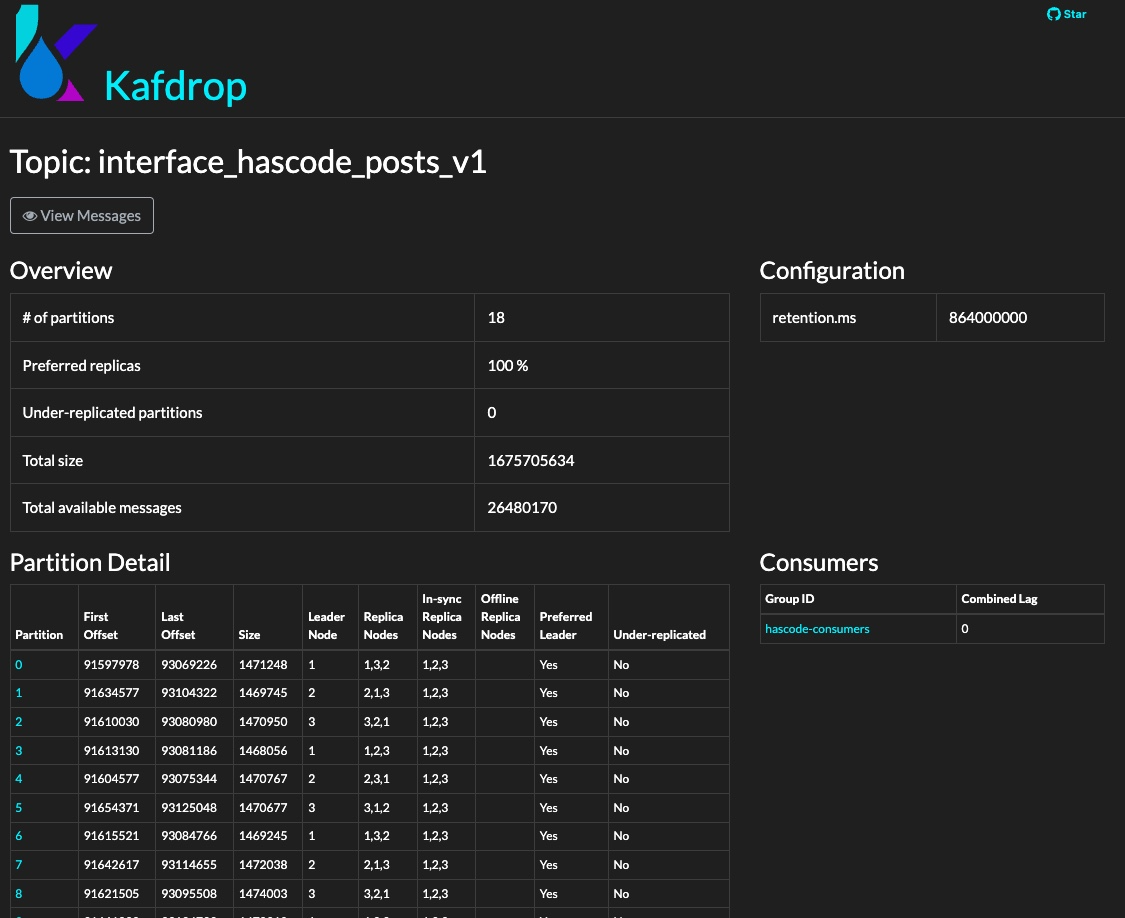
Quick Kafdrop Setup with Helm Charts
Figure 1. Kafdrop Topic Viewer In the ever-expanding world of data streaming and event-driven architecture, Apache Kafka has emerged as a cornerstone for reliable and scalable data processing. However, managing and monitoring Kafka clusters can often present its own set of challenges. This is where Kafdrop, a web-based Kafka consumer group and topic viewer, comes to the rescue. With its intuitive interface and insightful visualizations, Kafdrop offers developers and operators an efficient way to gain valuable insights into Kafka clusters. ...
Postgres with docker-compose or Docker and pg_stat_statements enabled
pg_stat_statements is useful to gather performance information about queries so lets add it to our dockerized postgres database. Using docker-compose Using docker-compose we just need to add the following docker-compose.yaml: docker-compose.yml version: '3.5' services: postgres: container_name: postgres_container image: postgres ports: - "5432:5432" volumes: - /var/lib/postgresql/data # used for query profiling, deactivate for enhanced performance command: postgres -c shared_preload_libraries=pg_stat_statements -c pg_stat_statements.track=all -c max_connections=200 environment: POSTGRES_USER: postgres POSTGRES_PASSWORD: thepassword We simply start our Postgres database with docker-compose: ...
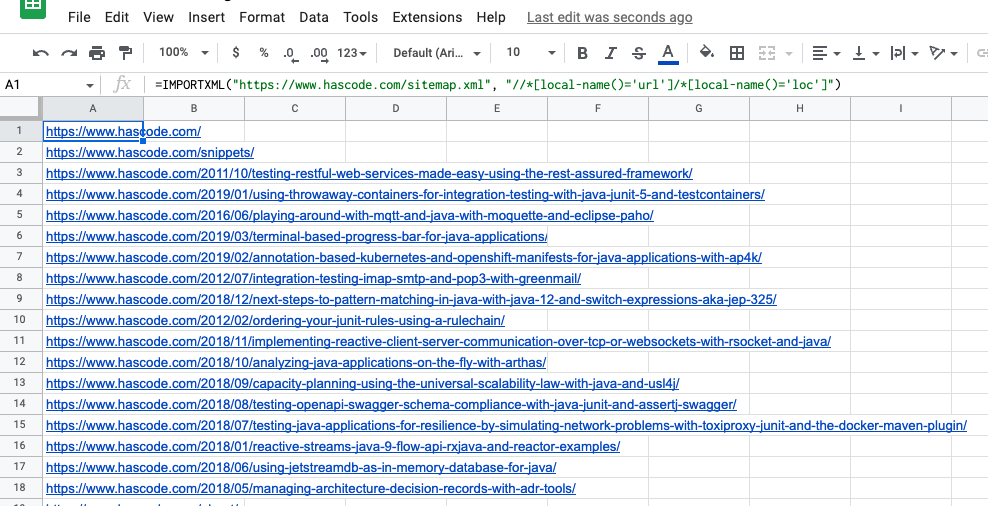
Importing a Sitemap XML into Google Sheets
The Goal In the following short article, we want to import data from an existing sitemap XML file into a new Google Sheet document. The sheet must pull the sitemap via HTTP protocol and extract all the URLs from the sitemap and insert them. into the sheet. Implementation Now let’s implement it .. it only takes 1 minute … For demonstration purpose, I’m going to use the sitemap from my old blog, to be found at https://www.hascode.com/sitemap.xml. ...
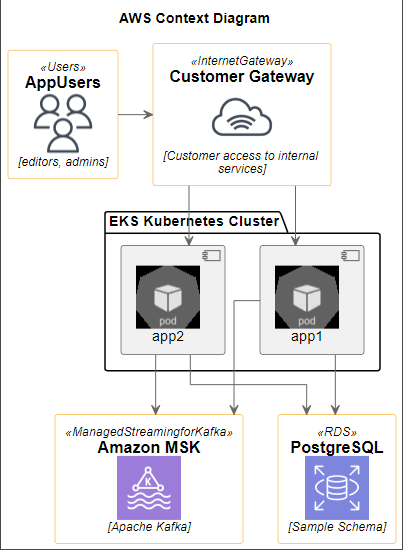
Modeling AWS Structures with PlantUML and AsciiDoc
The AWS shapes are included in the PlantUML stdlib .. simply include them as shown here: example.puml @startuml !include <awslib/AWSCommon> !include <awslib/Analytics/ManagedStreamingforKafka> !include <awslib/Database/RDS> !include <awslib/General/Users> !include <awslib/General/InternetGateway> !include <kubernetes/k8s-sprites-labeled-25pct> skinparam linetype ortho title "AWS Context Diagram" package "EKS Kubernetes Cluster" as eks_cluster { component "<$pod>\napp1" as pod1 component "<$pod>\napp2" as pod2 } ManagedStreamingforKafka(kafka_pod, "Amazon MSK", "Apache Kafka") RDS(pg_rds, "PostgreSQL", "Sample Schema") Users(users, "AppUsers","editors, admins") InternetGateway(igw1, "Customer Gateway", "Customer access to internal services") users -> igw1 igw1 --> pod1 igw1 --> pod2 pod1 --> pg_rds pod1 --> kafka_pod pod2 --> pg_rds pod2 --> kafka_pod @enduml ...
C4 Modeling with PlantUML and AsciiDoc
C4 models allow us to visualize software architecture by decomposition in containers and components. Viewpoints are organized in hierarchical levels: Context Diagrams (Level 1) Container Diagrams (Level 2) Component Diagrams (Level 3) Code Diagrams (Level 4) C4-PlantUML offers a variety of macros and stereotypes that make modeling fun. An example in PlantUML: sample.puml @startuml !include <c4/C4_Context.puml> !include <c4/C4_Container.puml> left to right direction Person(user, "User") System_Ext(auth, "AuthService", "Provides authentication and authorization via OIDC") System_Boundary(zone1, "Some system boundary") { System(lb, "Load Balancer") System_Boundary(az, "App Cluster") { System(app, "App Servers") { Container(app1, "App1", "Docker", "Does stuff") Container(app2, "App1", "Docker", "Does stuff") ContainerDb(dbSess, "Session DB", "Redis") ContainerDb(db1, "RBMS 1", "AWS RDS Postgres") ContainerDb(db2, "RBMS 2", "AWS RDS Postgres") ' both app servers sync sessions via redis Rel(app1, dbSess, "Uses", "Sync Session") Rel(app2, dbSess, "Uses", "Sync Session") ' both app servers persist data in RDBMS Rel(app1, db1, "Uses", "Persist/query relational data") Rel(app2, db2, "Uses", "Persist/query relational data") } } } Rel(user, lb, "call") Rel(lb, app1, "delegate") Rel(lb, app2, "delegate") Rel(app1, auth, "Verify", "User auth") Rel(app2, auth, "Verify", "User auth") SHOW_FLOATING_LEGEND() @enduml ...
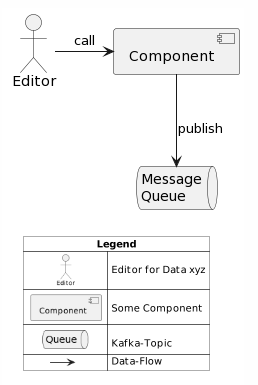
Snippet: Adding Legends to PlantUML Diagrams
The following hack allows us to draw a diagram in a diagram in a table in a legend :D example-diagram.puml @startuml skinparam legendBackgroundColor transparent skinparam legendBorderColor transparent actor Editor as editor queue Queue as "Message\nQueue" editor -> [Component] : call [Component] --> Queue : publish legend right {{ scale 0.7 skinparam defaultFontSize 14 skinparam BackGroundColor transparent skinparam defaultBackgroundColor white !procedure $entry($type, $label, $scale=1) {{\nscale $scale \nskinparam backgroundcolor transparent\nlabel " " as A\nlabel " " as B\n $type \n}} => $label !endprocedure map "<b>Legend</b>" as legend #white { $entry(":Editor:","\nEditor for Data xyz", 0.6) $entry("[Component]","\nSome Component", 0.8) $entry("queue Queue","\nKafka-Topic", 1) $entry("A -> B","Data-Flow") } }} endlegend @enduml ...